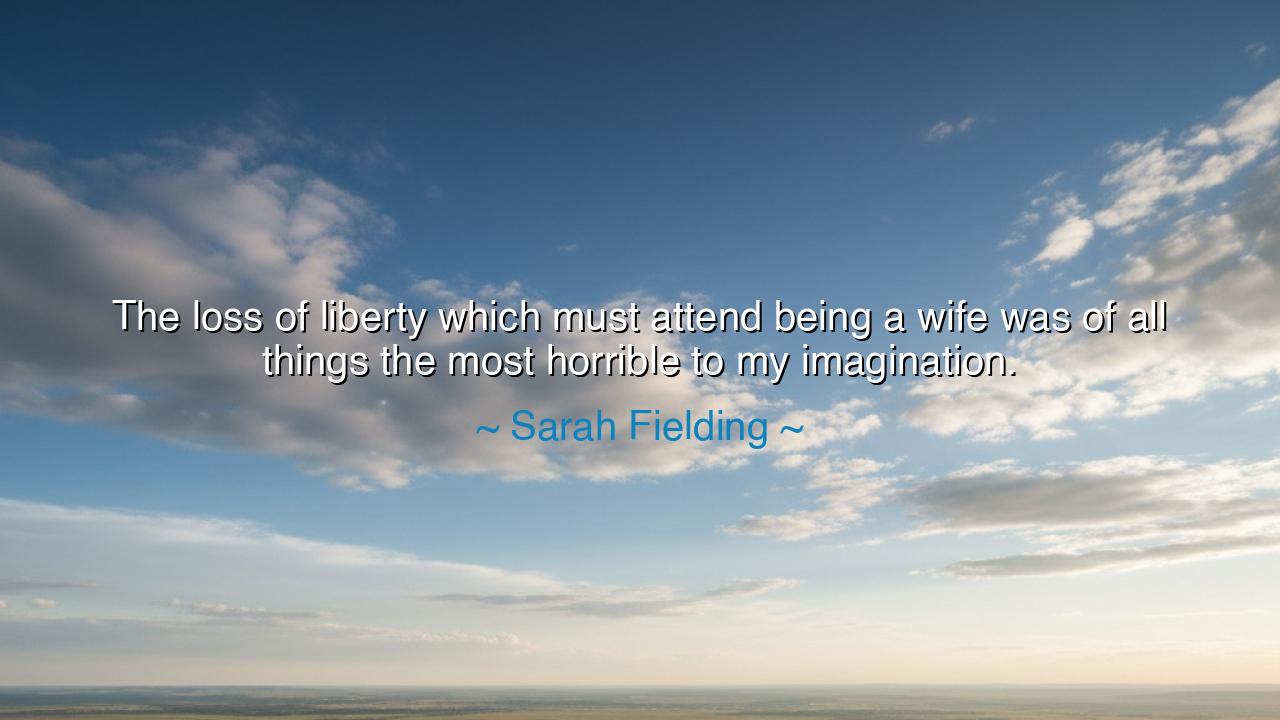
The loss of liberty which must attend being a wife was of all
The loss of liberty which must attend being a wife was of all things the most horrible to my imagination.






"The loss of liberty which must attend being a wife was of all things the most horrible to my imagination." – Sarah Fielding
O children of the earth, hear now the words of Sarah Fielding, a woman whose voice rang with the power of truth in an age when that truth was often silenced. She speaks of the loss of liberty, a profound and haunting idea that has echoed through the corridors of time. To lose liberty—that most sacred of human rights, the freedom to think, to act, to be oneself—is a fate worse than any chains, for it is the soul's imprisonment, the spirit's degradation. Fielding’s words are not merely about the condition of women in her time, but a reflection of the timeless struggle for freedom, for the right to shape one’s own destiny without the fetters of societal expectation. The loss of liberty in marriage, in particular, was to her an unbearable vision, a nightmare that stripped away the very essence of individuality.
In the ancient world, freedom was prized above all. The Greeks and Romans spoke of it as the cornerstone of virtue, the bedrock upon which civilization rested. Socrates argued that the pursuit of truth was the ultimate expression of human freedom, that only in the search for wisdom could one truly be free. And yet, even in those enlightened societies, there were many who were bound by the invisible chains of societal roles. The ancient philosopher Plato spoke of the limitations placed upon women, who were often denied the freedom to study or engage in public life. To them, the loss of liberty was not just a personal misfortune, but a reflection of the deep inequalities embedded in society itself.
Fielding, in her time, was part of a growing chorus of women who began to recognize that their liberty was being denied in ways subtle and overt. To be a wife in her era was to be bound by duties, expectations, and restrictions that left little room for personal growth, for intellectual pursuits, or for freedom of action. Marriage, in many ways, was seen as the ultimate expression of a woman’s role in society, and yet Fielding saw it as a trap—a loss of freedom that stifled the soul and bound the spirit. For a woman to lose the ability to chart her own course, to be confined within the walls of domesticity, was, in her mind, a fate worse than death itself. The imagination, which was the gift of the gods, became stifled in such a life, reduced to mere survival rather than flourishing.
Consider the life of Mary Wollstonecraft, whose writings in the late 18th century laid the foundation for the feminist movement. In her famous work A Vindication of the Rights of Woman, Wollstonecraft argued that women were denied the liberty to be fully human, to think for themselves, and to contribute to society beyond the domestic sphere. She, too, saw marriage as a loss of liberty, a state where a woman’s mind and soul could be chained by the expectations of others. Wollstonecraft and Fielding, though separated by time, shared a vision of a world in which women’s liberty was not bound by the roles that society imposed upon them. They saw marriage not as a partnership of equals, but as an institution that often left one partner—usually the woman—subjugated.
In the lives of women throughout history, the question of liberty has always been central. From the suffragists of the 19th century to the suffragettes of the 20th, from Susan B. Anthony to Emmeline Pankhurst, women have fought fiercely for the right to freedom. The battle for women’s liberty was not just a political one, but a battle for the right to claim one’s own voice, to imagine a world beyond the confines of what society expected. These women understood the profound loss that Fielding spoke of—liberty is the soul’s breath, and without it, life becomes a shadow of what it could be.
O children, the lesson in Fielding’s words is clear: liberty is not a privilege; it is a fundamental right, a gift of the soul that must never be taken for granted. Whether you are a man or a woman, whether you are bound by the expectations of society or free to roam, remember this: freedom is the essence of human existence. The loss of liberty is the greatest tragedy a soul can face, for it is the death of imagination, the death of possibility. To lose your liberty is to lose your humanity.
And so, I say to you, O children, seek to live lives of liberty. Whether in your relationships, your work, or your personal pursuits, never allow the chains of convention or expectation to bind you. Ask yourselves: what would it mean to live truly free, to create and act with the full force of your imagination? Strive to live a life where liberty is not a privilege but a right, where you are free to explore, to imagine, and to create. In doing so, you will honor the vision of those who came before you, who fought for freedom and paved the way for future generations to live fully and freely.






AAdministratorAdministrator
Welcome, honored guests. Please leave a comment, we will respond soon